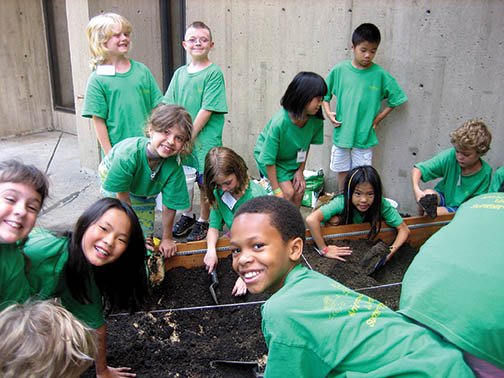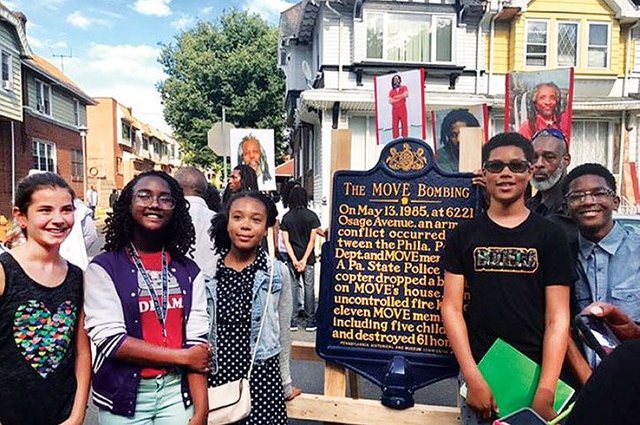Collaboration and Education: Funding Philly Public History
We are coming to a close on #philly5151's class project for the 2018 semester (to read more about the details of our class and program, head here!), and this week we are tasked with thinking about impact. Specifically, where would we donate $10,000, $100,000, $1,000,000 and $10,000,000 to have the most impact on the world of public history?
Because of my research and professional experience in the area, I'm going to focus my speculations on Philadelphia's cultural sector, and given my passion and personal belief system, most of that money will be going toward education and community outreach. The only way to save public history as a profession and a public service is to commit our institutions to good public history: history that is self-reflexive, collaborative, interactive, and usually a redressing of underrepresented narratives.
Here goes nothin'...
$10,000: Scholarships to History Summer Camps
Though this dollar amount isn't large enough to effect programmatic or operational change in most institutions, the comparatively low admission rates to Philadelphia's history summer camps provide an excellent opportunity to expose children in underserved neighborhoods to the city's cultural institutions and public history as a profession. Weekly camps at Germantown's Wyck Historic House run $250/week, and UPenn's popular Anthropologists in the Making Camp run $320/week, thus making them completely unaffordable for parents in lower income brackets--especially considering the free summer camps provided through Philadelphia's Park System and the Free Library. As for implementation, students could write a short essay or teachers could nominate history-loving students to determine scholarship recipients.

Elementary school students at UPenn's Anthropolgy and Archaeology Summer Camp program. Courtesy of the Penn Museum.
$100,000: Collaborative Planning Grant
A few weeks ago, I posted about the benefits of a possible "repositioning" of the Blockson Collection and the African American Museum of Philadelphia to present exhibits jointly. With $100,000, I want to fund a planning grant for a collaboration between the two institutions that would outline new educational programming and teacher partnerships. Neither institution currently provides lesson plans or teacher materials on their website, nor do they manage a teacher advisory board. This grant would create a strategic plan and materials for more inter-institutional programming for expanding and deepening the narrative of Civil Rights in Philadelphia, focusing on Reconstruction and post-1968 narratives.
$1,000,000: Historical Markers School Program
This is a dream project of mine that would either be through a large institution or a temporary experiment--my hope is for the former. Drawing on the influence and experience of these students in a West Philly high school who researched the MOVE Bombing Marker, teachers would get grants for their classrooms to become Historic Preservation Labs. This program would have the benefit of not only increasing representation of minority narratives on Philadelphia's landscape, but also of creating community history activists amongst the youth of the city. They gain experience as public historians and the confidence to continue their historical engagement beyond the classroom.

Students of Jubilee School who fought for MOVE bombing marker on Osage Avenue in West Philadelphia.
$10,000,000: Establish Student Advisory Boards
Quite honestly, it's hard for me to wrap my brain around 10 million dollars. Or really one million, for that matter. However, this project requires additional staffing, and the creation of endowments to ensure the longevity of the positions. Student Advisory Boards are not as common as Teacher Advisory Boards within Philadelphia's museum community; however, the model exists with the Temple Contemporary's Youth Advisory Council. It offers paid positions to five to ten local high schoolers to advise on the gallery's programming and to address local issues through art. Additionally, the YAC needs an adult moderator to guide/help implement their chosen projects and chaperone the meetings. In my limited knowledge of big ole amounts of money, I think this would fund a Youth Advisory Board at 4 separate institutions with 4 additional FTE staff at those institutions.
Which program would you most like to see in Philadelphia? Do these seem like reasonable distributions of such large amounts of money? Which institutions would benefit most from the $2.5 million investment?
100% of the SBD rewards from this #explore1918 post will support the Philadelphia History Initiative @phillyhistory. This crypto-experiment conducted by graduate courses at Temple University's Center for Public History and MLA Program, is exploring history and empowering education. Click here to learn more.
Seeking Chemistry and Creating Synergy:
Building on a hot new model
Mine, too...
Congratulations @chelseareed! You have completed some achievement on Steemit and have been rewarded with new badge(s) :
Click on any badge to view your own Board of Honor on SteemitBoard.
For more information about SteemitBoard, click here
If you no longer want to receive notifications, reply to this comment with the word
STOPCongratulations @chelseareed! You received a personal award!
Click here to view your Board
Congratulations @chelseareed! You received a personal award!
You can view your badges on your Steem Board and compare to others on the Steem Ranking
Vote for @Steemitboard as a witness to get one more award and increased upvotes!